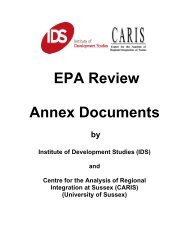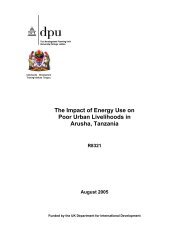Policy Levers in Malaysia - Department of International ...
Policy Levers in Malaysia - Department of International ...
Policy Levers in Malaysia - Department of International ...
Create successful ePaper yourself
Turn your PDF publications into a flip-book with our unique Google optimized e-Paper software.
CRISE <strong>Policy</strong> Context Paper 4, May 2004<br />
madani – an Islamically <strong>in</strong>formed concept <strong>of</strong> civil society – by the then Deputy Prime<br />
M<strong>in</strong>ister Anwar Ibrahim (Anwar 1996). As part <strong>of</strong> this rapprochement, over the past five<br />
years the government has allocated funds to support<strong>in</strong>g NGO activities.<br />
The ma<strong>in</strong> tools <strong>of</strong> control used by the state to monitor the NGOs, their leadership and<br />
activities are the Societies Act and the ISA. The Societies Act <strong>of</strong> 1966 required all social<br />
organizations to be registered with the Registrar <strong>of</strong> Societies under the M<strong>in</strong>istry <strong>of</strong> Home<br />
Affairs. A judge cannot <strong>in</strong>tervene with the Registrar’s acts and appeals can only be<br />
brought up to the M<strong>in</strong>ister <strong>of</strong> Home Affairs. Despite a broad grassroots protest, the<br />
Societies Act was amended <strong>in</strong> 1981 to tighten government control.<br />
Secular civil society<br />
S<strong>in</strong>ce the 1970s, then, <strong>Malaysia</strong> has seen a flourish<strong>in</strong>g <strong>of</strong> secular NGOs and civil society<br />
organisations campaign<strong>in</strong>g on universalist issues. These organisations are <strong>of</strong> <strong>in</strong>terest to<br />
CRISE as they <strong>of</strong>ten focus <strong>of</strong> areas <strong>of</strong> convergent <strong>in</strong>terest. Among this new wave <strong>of</strong><br />
NGOs, key organisations are:<br />
• UALIRANU. Aliran Kesedaran Negara, or the Movement for National Consciousness<br />
was formed <strong>in</strong> the late 1970s by a group <strong>of</strong> Penang-based academics. Its<br />
magaz<strong>in</strong>e Aliran Monthly is one <strong>of</strong> the most widely read <strong>in</strong>dependent periodicals<br />
<strong>in</strong> the country. Although ALIRAN is viewed with suspicion by the government, its<br />
central role <strong>in</strong> civil society networks make it an important contact po<strong>in</strong>t for CRISE.<br />
In addition, a number <strong>of</strong> scholars connected with ALIRAN, notably its secretary<br />
Francis Loh and committee member Maznah Mohamad, are <strong>in</strong>volved <strong>in</strong> research<br />
highly congruent to CRISE’s <strong>in</strong>terests.<br />
• UCAPU. Bely<strong>in</strong>g its somewhat parochial name, the Consumers’ Association <strong>of</strong><br />
Penang is another key national NGO. Historically, it has a somewhat fractious<br />
relationship with the government, but recent years have seen it move towards a<br />
more constructive engagement on some issues. Whilst ALIRAN tends to focus on<br />
broad reform issues, CAP takes a much more <strong>in</strong>cremental stance, fight<strong>in</strong>g for<br />
small changes. Perhaps due to this approach, CAP has an unrivalled record <strong>of</strong><br />
success amongst local NGOs <strong>in</strong> campaign<strong>in</strong>g for policy change. Whilst CAP rarely<br />
addresses directly issues <strong>of</strong> ethnicity, its concern with susta<strong>in</strong>able development<br />
and social redistribution, together with its record <strong>of</strong> successful campaign<strong>in</strong>g,<br />
make it potentially a key contact for CRISE.<br />
Trade unions<br />
The trade union sector <strong>in</strong> <strong>Malaysia</strong> has been viewed with suspicion by the post-colonial<br />
government, primarily due to its l<strong>in</strong>ks with Communist agitation <strong>in</strong> the post-war<br />
Emergency. Successive changes to the Industrial Relations Act and the Trade Unions<br />
Act have resulted <strong>in</strong> a ‘hollow corporatism’, <strong>in</strong> which nom<strong>in</strong>al trade union representation<br />
<strong>in</strong> statutory bodies is poor recompense for a legal sphere <strong>of</strong> <strong>in</strong>dustrial protest so limited<br />
as to be virtually mean<strong>in</strong>gless (Jomo and Todd 1993).<br />
With<strong>in</strong> the labour movement, the most effective policy lever is the <strong>Malaysia</strong>n Trades<br />
Union Congress (MTUC), the largest umbrella body for unions, which counts over half a<br />
million affiliate members. The MTUC has long been engaged <strong>in</strong> social campaign<strong>in</strong>g, most<br />
notably <strong>in</strong> its demands for a national m<strong>in</strong>imum wage. Despite its own ethnic<br />
factionalisation (Ackerman 1986), the MUTC has <strong>of</strong>ten been at the forefront <strong>of</strong> campaigns<br />
for greater ethnic equality, particularly with regard to the somewhat marg<strong>in</strong>alised Indian<br />
community. After effectively throw<strong>in</strong>g its weight beh<strong>in</strong>d the opposition for the 1990<br />
general elections, the MTUC has now moved to a more constructive engagement with the<br />
13
















